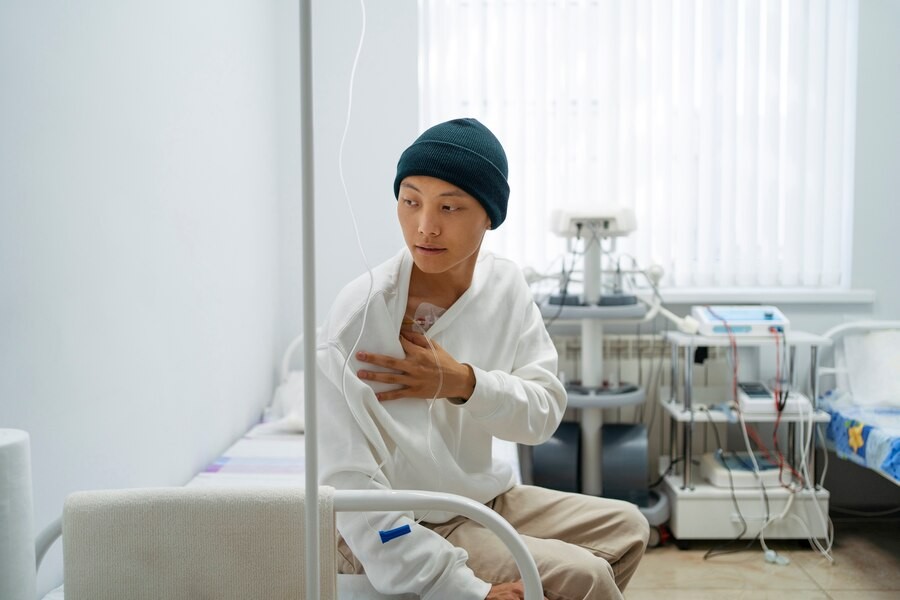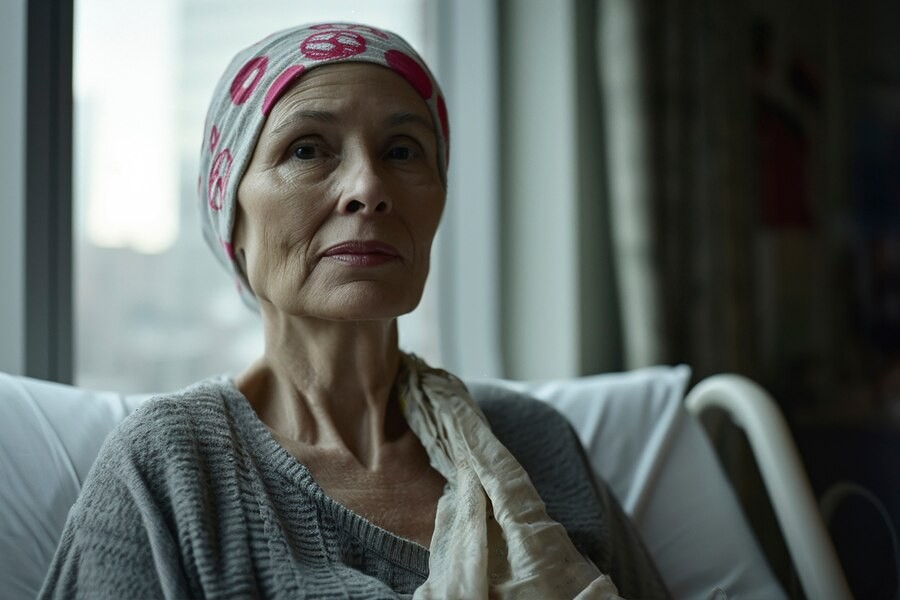Dulu, kanker lebih sering ditemui pada orang yang sudah lanjut usia. Namun, belakangan ini, kasus kanker semakin banyak dialami oleh mereka yang berusia 20 hingga 30-an.
Kanker yang muncul di usia muda cenderung lebih agresif, sehingga memberikan dampak fisik dan psikologis yang signifikan. Lalu, apa saja faktor yang menyebabkan peningkatan kasus kanker pada kelompok usia muda? Simak ulasannya.
Penyebab Kanker di Usia Muda
Kanker di usia muda memang menjadi fenomena yang semakin sering ditemui. Beberapa jenis kanker seperti leukemia, kanker tiroid, kanker limfoma, melanoma, kanker payudara, kanker serviks, dan kanker testis, cenderung lebih umum ditemukan pada kelompok usia muda.
Peningkatan kasus kanker pada usia muda bisa dipengaruhi oleh beberapa faktor, di antaranya:
Faktor genetik dan riwayat keluarga
Faktor genetik memiliki peran besar dalam meningkatkan risiko kanker di usia muda. Beberapa jenis kanker seperti kanker payudara, kanker ovarium, dan kanker usus besar sering dikaitkan dengan mutasi genetik tertentu yang diturunkan dari orang tua.
Apabila Anda memiliki keluarga dengan riwayat jenis kanker tertentu, risiko Anda memiliki jenis kanker yang sama atau kanker lainnya akan meningkat.
Paparan lingkungan dan polusi
Pencemaran udara, bahan kimia berbahaya, dan paparan radiasi dapat meningkatkan risiko kanker. Bahan kimia tertentu seperti asbes, radon, dan formaldehida, dikenal sebagai karsinogen yang dapat merusak sel-sel tubuh dan memicu perkembangan kanker.
Di kota-kota besar yang penuh dengan polusi udara, risiko kanker cenderung lebih tinggi. Terutama bagi mereka yang terus-menerus terpapar zat-zat berbahaya ini, baik di lingkungan tempat tinggal maupun di tempat kerja.
Baca Juga: Bukan Selalu Kanker, Ini Ragam Penyebab Benjolan di Ketiak
Gaya hidup tidak sehat
Pola hidup yang tidak sehat seperti merokok, minum alkohol, dan pola makan yang buruk bisa menjadi penyebab utama kanker di usia muda. Merokok merupakan salah satu penyebab utama kanker paru-paru, kanker mulut, dan kanker tenggorokan.
Sementara itu, konsumsi alkohol secara berlebihan dapat meningkatkan risiko kanker hati, kanker esofagus, dan kanker payudara. Selain itu, pola makan yang tinggi lemak, mengonsumsi makanan cepat saji dan rendah serat, dapat memicu obesitas dan peradangan dalam tubuh, yang keduanya berkontribusi pada peningkatan risiko kanker.
Paparan sinar UV
Paparan sinar UV yang berlebihan dapat merusak kulit dan meningkatkan risiko kanker kulit. Tren kecantikan, seperti berjemur atau menggunakan tanning bed tanpa perlindungan tabir surya, justru bisa memperburuk kerusakan kulit. Sinar UV dapat merusak DNA sel-sel kulit, yang pada akhirnya dapat memicu perubahan sel yang berpotensi berkembang menjadi kanker kulit, seperti melanoma.
Infeksi virus dan bakteri tertentu
Beberapa infeksi, seperti infeksi Human Papillomavirus (HPV), dapat menyebabkan kanker serviks pada perempuan muda. Selain itu, infeksi virus Epstein-Barr (EBV) juga dapat berkontribusi pada peningkatan kasus kanker limfoma.
Baca Juga: Ketahui Apa Saja Gejala Umum Kanker pada Anak
Stres dan kurang istirahat
Stres terus-menerus dan kurangnya waktu istirahat dapat melemahkan sistem kekebalan tubuh. Ketika tubuh dalam kondisi stres dan kurang istirahat, sel-sel tubuh yang rusak menjadi lebih sulit diperbaiki, sehingga proses pemulihan tubuh terganggu. Penelitian juga menunjukkan bahwa stres jangka panjang dapat mempercepat pertumbuhan sel kanker.
Faktor hormonal dan obat-obatan
Penggunaan obat-obatan tertentu, seperti kontrasepsi hormonal atau terapi penggantian hormon, dapat mempengaruhi keseimbangan hormon dalam tubuh dan berpotensi meningkatkan risiko kanker, terutama kanker payudara dan kanker ovarium.
Ada banyak upaya yang bisa dilakukan untuk mencegah kanker di usia muda, mulai dari pola hidup sehat, penggunaan tabir surya, vaksinasi, hingga olahraga teratur. Apabila Anda memiliki pertanyaan atau kekhawatiran terkait risiko kanker, Anda bisa berkonsultasi dengan dokter melalui aplikasi Ai Care yang bisa diunduh di App Store atau Play Store.
Mau tahu informasi seputar penyakit lainya? Cek di sini, yah!
- dr Nadia Opmalina
American Cancer Society (2024). Risk Factors and Causes of Cancers in Young Adults. Available from: https://www.cancer.org/cancer/types/cancer-in-young-adults/risk-factors-and-causes.html
American Cancer Society (2024). Types of Cancers That Develop in Young Adults. Available from: https://www.cancer.org/cancer/types/cancer-in-young-adults/cancers-in-young-adults.html
Kathy Katella (2024). What to Know About Rising Rates of 'Early-Onset' Cancer. Available from: https://www.yalemedicine.org/news/early-onset-cancer-in-younger-people-on-the-rise
Tim Gunn (2023). Early-onset cancer: why are more young adults being diagnosed?. Available from: https://news.cancerresearchuk.org/2023/01/24/early-onset-cancer-why-are-more-young-adults-being-diagnosed/
NIH (2024). Adolescents and Young Adults with Cancer. Available from: https://www.cancer.gov/types/aya
Motoki Iwasaki, et all (2023). Exposure to environmental chemicals and cancer risk: epidemiological evidence from Japanese studies. Available from: https://pmc.ncbi.nlm.nih.gov/articles/PMC10031963/
CDC (2023). Lifestyle Risk Factors. Available from: https://www.cdc.gov/environmental-health-tracking/php/data-research/lifestyle-risk-factors.html
American Cancer Society (2020). Diet and Physical Activity: What’s the Cancer Connection?. Available from: https://www.cancer.org/cancer/risk-prevention/diet-physical-activity/diet-and-physical-activity.html
Cancer Research UK (2023). How does the sun and UV cause cancer?. Available from: https://www.cancerresearchuk.org/about-cancer/causes-of-cancer/sun-uv-and-cancer/how-does-the-sun-and-uv-cause-cancer
American Cancer Society (2023). Viruses that Can Lead to Cancer. Available from: https://www.cancer.org/cancer/risk-prevention/infections/infections-that-can-lead-to-cancer/viruses.html
Yixin Liu, et all (2022). Stress and cancer: The mechanisms of immune dysregulation and management. Available from: https://pmc.ncbi.nlm.nih.gov/articles/PMC9579304/
Cancer Research UK (2023). Does the contraceptive pill increase risk of cancer?. Available from: https://www.cancerresearchuk.org/about-cancer/causes-of-cancer/hormones-and-cancer/does-the-contraceptive-pill-increase-cancer-risk
Cancer Research UK (2023). Does hormone replacement therapy (HRT) increase the risk of cancer?. Available from: https://www.cancerresearchuk.org/about-cancer/causes-of-cancer/hormones-and-cancer/does-hormone-replacement-therapy-increase-cancer-risk












